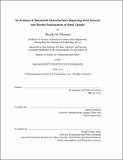| dc.contributor.advisor | Jarrod Goentzel. | en_US |
| dc.contributor.author | Wiseman, Micaela M.(Micaela Marie) | en_US |
| dc.contributor.other | Massachusetts Institute of Technology. Institute for Data, Systems, and Society. | en_US |
| dc.contributor.other | Technology and Policy Program. | en_US |
| dc.coverage.spatial | f-ug--- | en_US |
| dc.date.accessioned | 2019-09-17T16:29:53Z | |
| dc.date.available | 2019-09-17T16:29:53Z | |
| dc.date.copyright | 2019 | en_US |
| dc.date.issued | 2019 | en_US |
| dc.identifier.uri | https://dspace.mit.edu/handle/1721.1/122210 | en_US |
| dc.description | This electronic version was submitted by the student author. The certified thesis is available in the Institute Archives and Special Collections. | en_US |
| dc.description | Thesis: S.M. in Technology and Policy, Massachusetts Institute of Technology, School of Engineering, Institute for Data, Systems, and Society, 2019 | en_US |
| dc.description | Cataloged from PDF version of thesis. | en_US |
| dc.description | Includes bibliographical references (pages 131-134). | en_US |
| dc.description.abstract | According to the most recent Ugandan census, 40% of rural Ugandan households experience food insecurity and 25% live below the country's poverty line. Of the rural households, 80% are already engaged in some form of agriculture. Since market participation through selling crops is known to decrease both poverty and food insecurity, agricultural marketing presents one of the best economic opportunities for improving Ugandans' livelihoods. The USAID Feed the Future initiative focuses on designing programming to encourage market participation among Ugandan farming households by strengthening the market environment. In this thesis, we identify the household characteristics which are linked to enabling or inhibiting participation in the market in the Ugandan context in order to guide the design of USAID's activities there. | en_US |
| dc.description.abstract | We accomplish this by building three different regression models: one around the decision to participate in markets and two using different measures for the level of market participation. We use data from a recent household survey of Ugandan farmers covering a wide range of household characteristics. We received responses from 498 farming households that were randomly selected across 5 regions. We contextualize our results by discussing how the significant household characteristics may be considered when developing market facilitation activities. We also specifically analyze how food security is connected to facets of agriculture and market participation to explore how vulnerable populations may or may not be included in market facilitation efforts. | en_US |
| dc.description.abstract | Results from the model of the decision to participate in markets suggest that it is encouraged by the the size of nearby towns, number of available services, and membership in producer organizations, while transportation access had no impact. Results from both models for the level of market participation show that it is impacted by transportation access. Level of food insecurity does not impact market participation, indicating that the vulnerable food insecure population will be included in market facilitation programs. Level of agricultural production had a large impact the decision to participate in markets, the level of participation in markets, and food security. Market facilitation efforts should focus on developing producer organizations, encouraging local businesses which provide agricultural services, and strengthening input supply chains to improve farmers' production capacity. | en_US |
| dc.description.statementofresponsibility | by Micaela M. Wiseman. | en_US |
| dc.format.extent | 134 pages | en_US |
| dc.language.iso | eng | en_US |
| dc.publisher | Massachusetts Institute of Technology | en_US |
| dc.rights | MIT theses are protected by copyright. They may be viewed, downloaded, or printed from this source but further reproduction or distribution in any format is prohibited without written permission. | en_US |
| dc.rights.uri | http://dspace.mit.edu/handle/1721.1/7582 | en_US |
| dc.subject | Institute for Data, Systems, and Society. | en_US |
| dc.subject | Technology and Policy Program. | en_US |
| dc.title | An analysis of household characteristics impacting food security and market participation in rural Uganda | en_US |
| dc.type | Thesis | en_US |
| dc.description.degree | S.M. in Technology and Policy | en_US |
| dc.contributor.department | Massachusetts Institute of Technology. Institute for Data, Systems, and Society | en_US |
| dc.contributor.department | Massachusetts Institute of Technology. Engineering Systems Division | |
| dc.contributor.department | Technology and Policy Program | |
| dc.identifier.oclc | 1117710013 | en_US |
| dc.description.collection | S.M.inTechnologyandPolicy Massachusetts Institute of Technology, School of Engineering, Institute for Data, Systems, and Society | en_US |
| dspace.imported | 2019-09-26T21:00:42Z | en_US |
